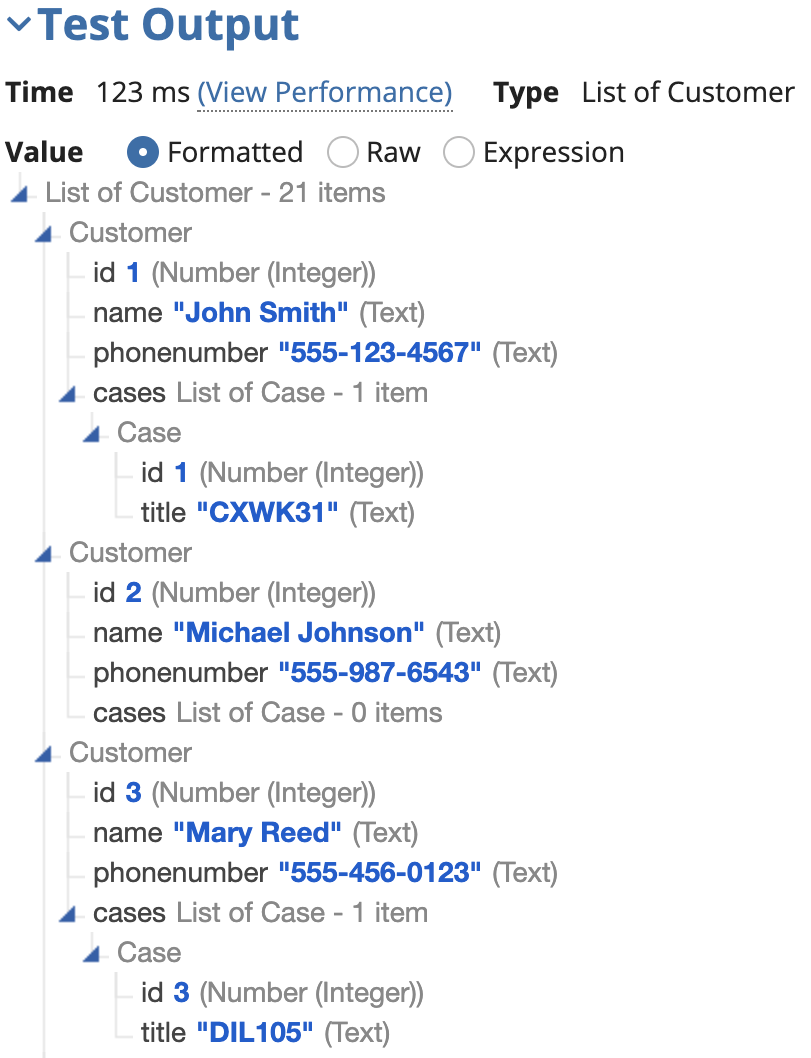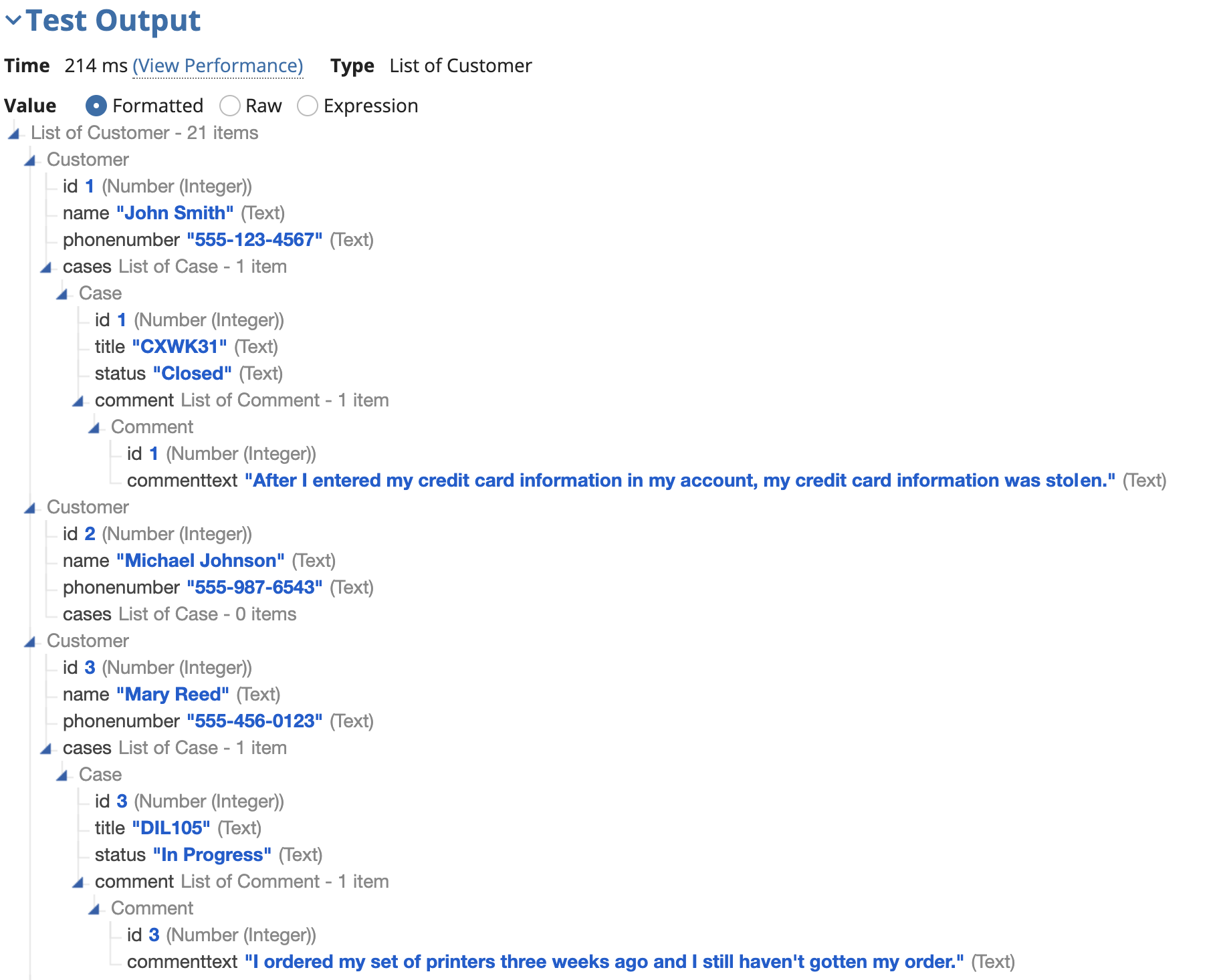FunctionCopy link to clipboard
References a one-to-many relationship defined on a record type and allows for additional filtering, sorting, and limiting of the related record set.
See also:
ParametersCopy link to clipboard
| Keyword | Type | Description |
|---|---|---|
|
|
Record Type Relationship |
A reference to a one-to-many record type relationship, configured using the |
|
|
Number (Integer) |
Number of related records to return. If you're using this function in a!queryRecordType() or in a records-powered component, the maximum number is 10. If you're using this function in a!queryRecordByIdentifier(), the maximum number is 100. |
|
|
List of SortInfo |
Array of Sort Info configurations created with |
|
|
Any Type |
A single logical expression or a list of query filters, which are applied together with an |
ReturnsCopy link to clipboard
List of RelatedRecordData
Usage considerationsCopy link to clipboard
Function requirementsCopy link to clipboard
This function is only supported on record types that have data sync enabled and have a one-to-many relationship with another record type.
You cannot use this function when performing an aggregation in a!queryRecordType() or in a records-powered chart.
Supported use casesCopy link to clipboard
Use this function to filter, sort, or limit the related record data returned from a one-to-many relationship referenced in a!queryRecordType(), a!queryRecordByIdentifier(), or in an a!recordData() function used in a read-only grid.
See Examples for sample use cases.
Limiting the related record setCopy link to clipboard
The maximum number of related records returned for each base record varies depending on the calling function:
| Function | Maximum number of related records |
|---|---|
a!queryRecordType() |
10 |
a!recordData() |
10 |
a!queryRecordByIdentifier() |
100 |
In any case, if you don't specify a limit, the maximum is applied by default.
For example, when querying multiple customers and their related support cases using a!queryRecordType(), the query will return a max of 10 related support cases for each customer if no limit is applied.
If you use a!queryRecordByIdentifier() to query a single customer and their related support cases, the maximum of 100 related records is returned by default.
Filtering and sorting the related record setCopy link to clipboard
When applying a filter or sort to a!relatedRecordData(), your record field or related record field reference must start from the related record type specified in the relationship parameter.
For example, the Department record type has a one-to-many relationship with the Employee record type, and you only want to see the employees in each department that have a status of "Active".
To return this data, you would do something like:
1
2
3
4
5
6
7
8
9
10
11
12
13
relatedRecordData: {
/*Only return related Employees that have a status of active*/
a!relatedRecordData(
! relationship: recordType!Department.relationships.employee,
filters: {
a!queryFilter(
! field: recordType!Employee.fields.status,
operator: "=",
value: "Active"
)
}
)
}
Copy
ExamplesCopy link to clipboard
The following examples demonstrate how to use a!relatedRecordData() in the a!queryRecordType() function. We'll use the Customer record type, which has a one-to-many relatonship with the Case record type, to return information about customers and their related support cases.
See the a!recordData() function for an example using a!relatedRecordData() in a read-only grid.
Record type object references are specific to each environment. If you copy and paste these examples into your interface, they will not evaluate. Use them as a references only.
Only return the latest customer support caseCopy link to clipboard
1
2
3
4
5
6
7
8
9
10
11
12
13
14
15
16
17
18
19
20
21
22
23
24
25
26
27
28
a!queryRecordType(
recordType: recordType!Customer,
fields: {
/*Fields from the Customer record type*/
recordType!Customer.fields.name,
recordType!Customer.fields.phoneNumber,
/*Related fields from the Case record type*/
recordType!Customer.relationships.cases.fields.title
},
relatedRecordData: {
/*Only return the latest support case for a customer*/
a!relatedRecordData(
relationship: recordType!Customer.relationships.cases,
sort: {
a!sortInfo(
field: recordType!Case.fields.createdOn,
ascending: false
)
},
limit: 1
)
},
pagingInfo: a!pagingInfo(
startindex: 1,
batchSize: 500
)
)
Copy
Returns

Only return customer cases that have a status of "critical"Copy link to clipboard
1
2
3
4
5
6
7
8
9
10
11
12
13
14
15
16
17
18
19
20
21
22
23
24
25
26
27
28
a!queryRecordType(
recordType: recordType!Customer,
fields: {
/*Fields from the Customer record type*/
recordType!Customer.fields.name,
recordType!Customer.fields.phoneNumber,
/*Related fields from the Case record type*/
recordType!Customer.relationships.cases.fields.title
},
relatedRecordData: {
/*Only return related cases that have a priority of critical*/
a!relatedRecordData(
relationship: recordType!Customer.relationships.cases,
filters: {
a!queryFilter(
field: recordType!Case.relationships.priority.fields.label,
operator: "=",
value: "Critical"
)
}
)
},
pagingInfo: a!pagingInfo(
startindex: 1,
batchSize: 500
)
)
Copy
Returns

Tip: Since there is no limit specified in a!relatedRecordData, the number of related records to return will default to 10.
Return the latest critical support case and the latest case commentCopy link to clipboard
1
2
3
4
5
6
7
8
9
10
11
12
13
14
15
16
17
18
19
20
21
22
23
24
25
26
27
28
29
30
31
32
33
34
35
36
37
38
39
40
41
42
43
44
45
46
47
48
49
50
a!queryRecordType(
recordType: recordType!Customer,
fields: {
/*Fields from the Customer record type*/
recordType!Customer.fields.name,
recordType!Customer.fields.customerSince,
/*Related fields from the Case record type*/
recordType!Customer.relationships.cases.fields.title,
recordType!Customer.relationships.cases.fields.status,
/*Related fields from the Comments record type*/
recordType!Customer.relationships.cases.relationships.comments.fields.commentText
},
relatedRecordData: {
/*Only return the latest case with a priority of critical*/
a!relatedRecordData(
relationship: recordType!Customer.relationships.cases,
filters: {
a!queryFilter(
field: recordType!Case.relationships.priority.fields.label,
operator: "=",
value: "Critical"
)
},
sort: {
a!sortInfo(
field: recordType!Case.fields.createdOn,
ascending: false
)
},
limit: 1
),
/*Only return the latest comment associated with each critical case*/
a!relatedRecordData(
relationship: recordType!Customer.relationships.cases.relationships.comments,
sort: {
a!sortInfo(
field: recordType!Comments.fields.createdOn,
ascending: false
)
},
limit: 1
)
},
pagingInfo: a!pagingInfo(
startindex: 1,
batchSize: 500
)
)
Copy
Returns

Feature compatibilityCopy link to clipboard
The table below lists this function's compatibility with various features in Appian.
| Feature | Compatibility | Note |
|---|---|---|
| Portals | Compatible | |
| Offline Mobile | Compatible | |
| Sync-Time Custom Record Fields | Incompatible | |
| Real-Time Custom Record Fields | Incompatible | Custom record fields that evaluate in real time must be configured using one or more Custom Field functions. |
| Process Reports | Incompatible | Cannot be used to configure a process report. |
| Process Events | Incompatible | Cannot be used to configure a process event node, such as a start event or timer event. |
